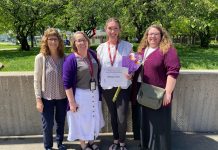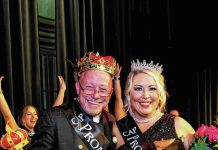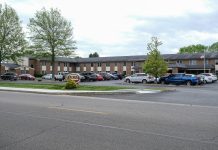A leader of an Indianapolis activist group said white supremacist ideology would end if people treated and confronted it as seriously as a marriage or family problem in the home.
“If you prioritize fighting white supremacy even as much as catching your favorite TV show that you want to watch, then white supremacy would end,” said Satchuel Cole, vice president of an Indianapolis-based group, Don’t Sleep, which deals with social injustice.
A range of straightforward comments from Cole drew applause from many among the estimated 85 people who attended a Monday evening Martin Luther King Jr. Day event organized by the Black Lives Matter of Columbus chapter. Cole and four other panelist spoke during the program at North Christian Church.
The issue is significant locally since two different groups linked with white supremacy last year held activities in Columbus, which implemented one of the state’s first human rights commissions in 1962.
[sc:text-divider text-divider-title=”Story continues below gallery” ]
Leaders of the local Black Lives Matter chapter, which consists of far more whites than blacks, regularly remind people that the name means that blacks matter just as much as any other race of people — not more than other races, as some detractors have said.
Blacks represent 2.3 percent of the estimated 2016 Bartholomew County population, compared to 88.8 percent that are white, 6.7 percent Asian and 6.5 percent Hispanic.
The meeting’s focus was a discussion of the late King’s 1963 “Letter From a Birmingham Jail.”
King’s missive, a document penned after one of his many arrests, defends the strategy of nonviolent resistance to racism. It became a key piece of the civil rights movement, written while some blacks were being refused service in restaurants and other businesses — and when racism in general remained rampant, especially in the South.
Organizers showed various paragraphs of the letter on an overhead screen and then formed questions for the panelists.
Besides Cole, panelists included:
The Rev. Fred King, a native of Birmingham, Alabama who grew up during a time when Jim Crow laws enforced segregation, and is a member of the local African American Pastors Alliance, which is involved in a broad range of social justice and community issues.
The Rev. Nic Cable, minister at the Unitarian Universalist Congregation of Columbus, who is also active in area social justice efforts.
Leah Humphrey, organizer/activist of Indy10 Black Lives Matter, also heavily involved in equality and social justice issues.
Kyra Harvey, also an organizer/activist of Indy10 Black Lives Matter.
One question presented to the panel was “Why aren’t more churches openly connected to the movement of racial equality?”
Fred King, who pastored several Christian churches, defended such bodies.
“Pastors are so very busy,” King said, including dealing with such extremes as life and death issues.
He added that long hours make it tough to add another event or meeting to the schedule, even if it is something as significant as race relations or equality.
Another question for panelists was “What are some steps people can take right now to improve racial equality?”
Cable said a balanced inner life centered on justice and equality should yield a life of actions that match that inward conviction and stance.
“Our spiritual liberation and our social liberation are deeply intertwined,” Cable said. “In our religious communities, we can take advantage of that belief and ask, ‘What is it that I’m doing that is helping me to liberate or unlearn certain (unhealthy) things so that I might live within my heart in a way that is in proper relationship to how I am living outside in the world? … When the two elements reinforce one another, all of the sudden you can discover a different kind of drive.”
Humphrey said she agreed with the late King’s letter that white moderates often “are worse than the KKK,” as she put it.
“They also can easily play a victim role when they are challenged (by blacks),” Humphrey said. “And you (as a black person) can quickly become the enemy.”
Audience reaction
The Rev. Teresa A. Poole, a member of the audience from Columbus and a United Methodist pastor, commented afterward on the late King’s reference to white moderates being a big hurdle to equality.
“White moderate is clearly tied to white privilege,” Poole said. “I have preached on white privilege before and am saddened on how many people do not believe they have privilege.”
Columbus resident Susan Burton was among people who applauded a number of Cole’s statements about destroying white supremacy ideology. She said she considers herself among truth seekers who attended.
“We seek to hear the truth of all peoples, and, in particular, we want to listen deeply to the hearts and minds of people we have been injuring, maybe inadvertently, maybe even intentionally, because we know we have been functioning in a national system where white people hold the power in all our major institutions,” Burton said.
[sc:pullout-title pullout-title=”About Black Lives Matter of Columbus” ][sc:pullout-text-begin]
Mission statement: Black Lives Matter of Columbus is an organization which focuses on black lives, black equity and black liberation. BLM of Columbus also focuses on peaceful protest to injustices to invoke necessary changes locally, to assist with national reform in our criminal justice system. We welcome all creeds/races/ethnicities to join. Discrimination and hateful rhetoric will not be tolerated. BLM hopes to facilitate unifying this diverse community, creating forums where honest and respectful dialogue can take place, and where change can happen for us and by us.
Chapter programs: A variety of speakers, films, and discussion since it formed in July 2016.
Behind the name: The group’s name means that blacks matter just as much as any other race of people — not more than other races. Its local leaders have been careful say from the beginning that they are not anti-police, and have have had dialog with local enforcement leaders and other community leaders.
Contact: [email protected] or the Facebook page for Black Lives Matter of Columbus IN.
[sc:pullout-text-end][sc:pullout-title pullout-title=”What you can do to promote racial equality” ][sc:pullout-text-begin]
Panelists at Monday’s Black Lives Matter of Columbus meeting offered some basic tips on how people can fight racism:
- Post or hang pictures in your home of symbols of the fight, whether that’s the Rev. Martin Luther King or, like panelist Satchuel Cole, unarmed Indianapolis black resident Aaron Bailey, shot and killed last year by Indianapolis Metro Police. She has three photos of him in her home.
- Educate yourself. Panelists encouraged audience members to read everything from news stories to books to Facebook feeds of those who understand issues. Then, work to educate your community.
- Carefully build spiritual or personal beliefs about equality that can then flow from your heart into a plan of support or social action.
[sc:pullout-text-end][sc:pullout-title pullout-title=”Adcovacy and the arts” ][sc:pullout-text-begin]
Monday’s Black Lives Matter meeting, much like its gatherings in the past, also highlighted the black struggle via the arts.
- Columbus singer Abigail Jackson opened the event with a slow-paced, emotional rendition of the Nina Simone song, “Blackbird,” which focuses on facing pain and rejection.
- Indianapolis spoken word poet Manon Voice performed an original rhythmic rhyme highlighted blacks’ experience with injustice while holding firmly to hope.
[sc:pullout-text-end]




